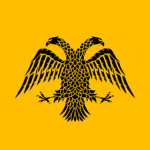Home > Blossary: Byzantine Empire
The Byzantine Empire was the predominantly Greek-speaking continuation of the Roman Empire during Late Antiquity and the Middle Ages. Its capital city was Constantinople (modern-day Istanbul), originally known as Byzantium. Initially the eastern half of the Roman Empire (often called the Eastern Roman Empire in this context), it survived the 5th century fragmentation and fall of the Western Roman Empire and continued to exist for an additional thousand years until it fell to the Ottoman Turks in 1453. During most of its existence, the empire was the most powerful economic, cultural, and military force in Europe. Both "Byzantine Empire" and "Eastern Roman Empire" are historiographical terms applied in later centuries; its citizens continued to refer to their empire as the Roman Empire , and Romania .
Like
Created by: KSGRAM
Number of Blossarys: 9
Slovenian (SL)
Compare Language
There are no other language terms for this blossary. - Prevedi izraz
Constantine VII Porphyrogennetos or Porphyrogenitus, "the Purple-born" (that is, born in the imperial bed chambers) (born at September 2, 905 – died at November 9, 959), was the fourth ...
Domain: History; Category: European history
Theodosius I also known as Theodosius the Great, was Roman Emperor from 379 to 395. Theodosius was the last emperor to rule over both the eastern and the western halves of the Roman Empire. His ...
Domain: History; Category: European history
Diocletian was Roman emperor from 284 to 305. Born to a family of low status in the Roman province of Dalmatia, Diocletian rose through the ranks of the military to become cavalry commander to the ...
Domain: History; Category: European history
Julian ( also known as Julian the Apostate, as well as Julian the Philosopher, was Roman Emperor from 361 to 363 and a noted philosopher and Greek writer.
A member of the Constantinian dynasty, ...
Domain: History; Category: European history
Constantinople by this stage was underpopulated and dilapidated. The population of the city had collapsed so severely that it was now little more than a cluster of villages separated by fields. On 2 ...
Domain: History; Category: European history
In 1054, relations between the Eastern and Western traditions within the Christian Church reached a terminal crisis, known as the East–West Schism. Although there was a formal declaration of ...
Domain: Religion; Category: General religion
Constantine the Great (born at 27 February c. 272 – died at 22 May 337), also known as Constantine I or Saint Constantine, was Roman Emperor from 306 to 337. Constantine was the son of Flavius ...
Domain: History; Category: European history
My other Blossarys
A list noting some of the most worthy scientists ...
Category: Science
By: KSGRAM
A list of the amazing wonders that man made in ...
Category: History
By: KSGRAM
A blossary to make you familiar with some of the ...
Category: Geography
By: KSGRAM
Greek mythology is the body of myths and ...
Category: History
By: KSGRAM


 English (EN)
English (EN)




